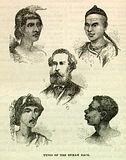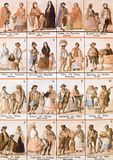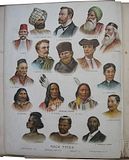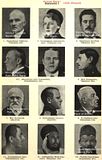A few years ago, when we still had time for such things, my husband and I belonged to a book group. One of the last books the group read before it’s leader moved away (and, having become a first-time parent that year, I declined to be in charge of much else besides keeping myself in relatively clean clothes) sparked an exchange between me and my husband that came to mind as I watched the Sonia Sotomayor confirmation hearings.
The book was Middlesex (a delightful read), and in one chapter the protagonist’s family of Greek immigrants shopped for a new home. They encountered a real estate agent who asked how many relatives lived with them, and subtly directed them toward certain neighborhoods and away from one — where "ethnics" like themselves would "not fit in."
It hit me like a slap in the face. It sounded familiar, but different. To me, this fictional family was white. But in the time and place they occupied on the page they weren’t "white enough."
"Oh my God!" I exclaimed. My husband, who was reading the same book, looked at me.
I looked up from the page, looked at him, and said with a note of wonder in my voice, "There are different shades of white."
"Yes," the son-of-Polish-immigrants that I married said, dryly. "There are."
Or at least there were. From the moment Judge Sotomayor’s nomination was announced, it’s become more and more evident that all those varied shades of white have since blended into a much paler, but more uniform, shade.
In fact, the more I think about it, it seems like there are a great number of White Americans today who are a few generations removed from being "not white enough" to just "White" or just "American" as opposed to Irish-American or Italian-American.
There is room under that umbrella for a number of formerly "ethnic" Americans who are now finally "white enough" to just be White.
White American (often used interchangeably with "Caucasian American"[3] and within the United States simply "white"[4]) is an umbrella term officially employed by the United States Census Bureau, Office of Management and Budget and other U.S. government for the classification of United States citizens or resident aliens "having origins in any of the original people of Europe,[5] the Middle East, or North Africa".[6]
German Americans (16.8%), Irish Americans (12.1%), English Americans (9.3%), Italian Americans (5.9%), Polish Americans (3.3%), French Americans (3.2%), Scottish Americans (2%), Scotch-Irish Americans (1.8%), Dutch Americans (1.7%), Norwegian Americans (1.5%), Swedish Americans (1.4%), and Russian Americans (1%) make up 60% of the "White" population.[7] Included in the category are White Hispanics representing 8.11%,[1] mainly Mexican Americans.
Whites constitute the majority of the US population with 73.94% of the population. Whites are regarded as the socially and demographically dominant racial group in the United States.
It’s a kind of homogenizing process rendering those with the right qualifications a paler shade of white.
The homogeneity assumption is best described as a cultural ideology of "Americanization," a monistic view that Anglo-Saxon culture is the core American culture and that Anglo-Saxon culture is superior to all others.
…in our cultural dialogue Americanization is commonly expressed as (1) utilitarian arguments made with respect to immigration and assimilation and (2) the view that the dominant Anglo-American culture represents the one "true" American culture. This dialogue, not always overtly stated, regarding why immigrants should assimilate and what it is that makes up the core American identity, deeply influences how we think about ourselves and those who the majority perceives as falling outside the assumption of sameness, which becomes also the assumption of who should be included in the monolithic whole.
Actually it is overtly stated at times, and not just by the usual suspects, but often with those who have the most invested in maintaining the status quo on ethnic primacy, because they have only recently (if one takes a long view of history) gained admission for themselves. And if seems to render they unconscious to both present and historical realities, that is both the price and the intended effect of admission.
Once you become part of the cultural Baseline, of which the rest of is must be constantly aware of (along with our relationship to it) at all times, you must hold the line. Lest it be erased.
It means that someone like Pat Buchanan — no doubt so distressed over living in an America with a black president in a White House built by black slaves — can assert that America was pretty much "built by white folks", and seem to utterly ignore historic fact.
When asked why the overwhelming majority of justices have been white, Buchanan declined to explicitly cite discrimination, but explained that "White men were 100% of the people that wrote the Constitution, 100% of the people that signed the Declaration of Independence, 100% of the people who died at Gettysburg and Vicksburg, probably close to 100% of the people who died at Normandy. This has been a country built basically by white folks, who were 90% of the nation in 1960 when I was growing up and the other 10% were African-Americans who had been discriminated against. That’s why."
He has to remain ignorant, and obviously with great effort if he can say, without a hint of irony, that “what is happening now to white men right now is exactly what was done to black folks for years.” And he said it at the almost the same time that President Obama and his family — with his wife and daughters who are descendants of slaves — stood at the "door of no return," during a visit to Ghana’s Elmina Castle.
Buchanan says what he does because he has to. He has to be ignorant of the inaccuracies of his own statements. He has to remain ignorant of his own history and the reality that his own people — the Irish — were originally "not white enough" but became white, through the process of "Americanization" or assimilation mentioned above.
It was a tough read. It was a story of primarily Irish Catholic emigration before and after the potato famine – roughly 1840 to the Civil War – and that people’s struggle to survive in this white, Protestant world. It’s a sympathetic yet tragic story of how race has been a defining characteristic in U.S. culture and how the race question has also plagued the white working class in this country. One might say that it is a story of how the Irish exchanged their greenness for whiteness, and collaborated with the dominant white culture to continue the oppression of African Americans.
Ironically, Irish Catholics came to this country as an oppressed race yet quickly learned that to succeed they had to in turn oppress their closest social class competitors, free Northern blacks. Back home these "native Irish or papists" suffered something very similar to American slavery under English Penal Laws. Yet, despite their revolutionary roots as an oppressed group fighting for freedom and rights, and despite consistent pleas from the great Catholic emancipator, Daniel O’Connell, to support the abolitionists, the newly arrived Irish-Americans judged that the best way of gaining acceptance as good citizens and to counter the Nativist movement was to cooperate in the continued oppression of African Americans. Ironically, at the same time they were collaborating with the dominant culture to block abolition, they were garnering support from among Southern, slaveholding democrats for Repeal of the oppressive English Act of the Union back home. Some even convinced themselves that abolition was an English plot to weaken this country.
… Irish and African Americans had lots in common and lots of contact during this period; they lived side by side and shared work spaces. In the early years of immigration the poor Irish and blacks were thrown together, very much part of the same class competing for the same jobs. In the census of 1850, the term mulatto appears for the first time due primarily to inter-marriage between Irish and African Americans. The Irish were often referred to as "Negroes turned inside out and Negroes as smoked Irish." A famous quip of the time attributed to a black man went something like this: "My master is a great tyrant, he treats me like a common Irishman." Free blacks and Irish were viewed by the Nativists as related, somehow similar, performing the same tasks in society. It was felt that if amalgamation between the races was to happen, it would happen between Irish and blacks. But, ultimately, the Irish made the decision to embrace whiteness, thus becoming part of the system which dominated and oppressed blacks. Although it contradicted their experience back home, it meant freedom here since blackness meant slavery.
That process of "Americanization" wasn’t exclusive tongue Irish, of course. Germans went through the same proccess.
GERMAN IMMIGRANTS and African Americans enjoyed relatively positive social, economic, and political relations during the mid- to late-nineteenth century, especially when compared to relations between white and black southerners. The Germans were a middleman minority community, occupying a middle tier on the racial and ethnic hierarchy below white southerners and above African Americans.1 Exceptional relations declined in the 1870s, coinciding with the failure of Reconstruction and the so-called Democratic Redemption of 1876.
…It is difficult to explain the Germans’ transition to becoming white southerners without situating the case study within a few historiographical trajectories, mainly urban slavery; pre-industrial economic history; Reconstruction social and political history; and, of course, mid-nineteenth-century immigration history.3 As the title aptly suggests, this essay is interested in the ways Germans became white southerners.4 They never stopped being German, but they increasingly identified themselves as white southerners. White southerners as an ethnic group, in the main, remained committed to white supremacy pre- and post-emancipation, and that commitment created tension between whites and blacks. White southerners were overwhelmingly wedded to the Democratic Party, and their social and political spheres were inseparable. By 1876, Germans identified with white southern Democrats, some faster than others, while some Germans migrated out, and others withdrew from public life altogether.
It was a doorway to assimilation open to all who could simultaneously "Never stop being German," or Irish, and yet identify themselves as White, without surrendering their authentic ethnic identity. In doing so they homogenized themselves until they were "white enough" to be considered simply "American."
Sometimes they were even able to fit their rather non-anglicized names through that door with them. Conservative commentator Mark Krikorian demonstrated this when he pronounced the pronunciation of Sotomayor (with the emphasis on the last syllable) "unnatural in English", and then went on to explain in excruciating detail how his own non-Anglo (Armenian) surname is not "unnatural" and in fact follows the proper rules of pronunciation, with the emphasis on the correct (second, as opposed to last) syllable.
Names, by the way, matter. It was pointed out on election night that Barack Obama is not just our first Black president, but also the first whose surname ends in a vowel, and is now the first and only "ethnic," non-Anglo or non-Anglicized name on the roster of U.S. Presidents.
Of course, nobody planned this. Surnames are different from company and product names, which people invent. No candidate sits down and decides what name to use in a bid for the presidency. But a screening process has taken place historically. Though we’re a nation of immigrants from everywhere, the list of presidents’ names is overwhelmingly Anglo-derived, reflecting a prejudice that has stubbornly held on in political elections despite general improvements in Americans’ attitudes about ethnicity. It’s obvious that there are no non-European-sounding names on the list of U.S. presidents. But even if you limit yourself to Europe, there are no names whose origins are distinctly Polish, Greek, Italian, Spanish, or Norwegian, either. And lots of other European ethnicities could be added to that list.
The only “ethnic” (i.e. non-Anglo) names on the list of U.S. presidents are Roosevelt, Van Buren, and Hoover (Dutch); Monroe, Polk, Buchanan, and McKinley (Scottish); Kennedy and Reagan (Irish); and Eisenhower (an Americanized form of German Eisenhauer). Plotting the geographical origins of those names on a map doesn’t get you very far from England. Leaving aside the Celtic-derived names, which got all mixed up with English before there was a United States, you’re left with a list of names derived entirely from the West Germanic branch of the Indo-European language family.
Now along comes this guy named Obama. His name comes from Luo, a Nilo-Saharan language spoken, among other places, in Western Kenya, where his father was born. This is a big jump in the linguistic family tree. What we see in the name Obama is a typological difference between Germanic and the languages related to Luo. While Germanic has a tendency toward closed syllables, which begin and end with consonants, Luo tends more toward open syllables, which end with vowels.
And the Obama’s election — race and vowel-heavy surname not withstanding — makes a difference.
Perhaps Obama’s success to date is a sign that America finally is maturing as a place of unlimited opportunity for all; that the immigrant heritage we all share somewhere down the line no longer requires dilution; and that those of us with A’s on the ends of our names — or I’s, O’s or U’s — can be president.
But Krikorian’s laborious take on why names are important — why his own is more acceptable than Judge Sotomayor’s, and why she should accept his pronunciation of her name — (because he is a white man now, after all, a white man now, and has the privilege of deciding who’s called what) suggests that demanding other minorities undergo the same process of "Americanization" as the Irish, German, Dutch, Irish, Scottish, etc., actually requires sacrificing more identity than any of these other groups had to — perhaps even to the point of impossibility.
Most e-mailers were with me on the post on the pronunciation of Judge Sotomayor’s name (and a couple griped about the whole Latina/Latino thing — English dropped gender in nouns, what, 1,000 years ago?). But a couple said we should just pronounce it the way the bearer of the name prefers, including one who pronounces her name "freed" even though it’s spelled "fried," like fried rice. (I think Cathy Seipp of blessed memory did the reverse — "sipe" instead of "seep.") Deferring to people’s own pronunciation of their names should obviously be our first inclination, but there ought to be limits. Putting the emphasis on the final syllable of Sotomayor is unnatural in English (which is why the president stopped doing it after the first time at his press conference), unlike my correspondent’s simple preference for a monophthong over a diphthong, and insisting on an unnatural pronunciation is something we shouldn’t be giving in to.
For instance, in Armenian, the emphasis is on the second syllable in my surname, just as in English, but it has three syllables, not four (the "ian" is one syllable) — but that’s not how you’d say it in English (the "ian" means the same thing as in English — think Washingtonian or Jeffersonian). Likewise in Russian, you put the emphasis in my name on the final syllable and turn the "o" into a schwa, and they’re free to do so because that’s the way it works in their language. And should we put Asian surnames first in English just because that’s the way they do it in Asia? When speaking of people in Asia, okay, but not people of Asian origin here, where Mao Tse-tung would properly have been changed to Tse-tung Mao. Likewise with the Mexican practice of including your mother’s maiden name as your last name, after your father’s surname.
This may seem like carping, but it’s not. Part of our success in assimilation has been to leave whole areas of culture up to the individual, so that newcomers have whatever cuisine or religion or so on they want, limiting the demand for conformity to a smaller field than most other places would. But one of the areas where conformity is appropriate is how your new countrymen say your name, since that’s not something the rest of us can just ignore, unlike what church you go to or what you eat for lunch. And there are basically two options — the newcomer adapts to us, or we adapt to him. And multiculturalism means there’s a lot more of the latter going on than there should be.
Krikorian’s forebears — like those of any number of Republicans "carping" about … well … just about everything in the Age of Obama — made a decision, as some point, to walk through that "doorway to assimilation," taking with them much of their identity and culture, and sometimes their names, but more often than not some Americanized version.
The Irish, Germans, and other European immigrants — as noted above — often started out in America with only a slightly better social position than African Americans; mainly because everything about them that reflected their culture of origin — from their language to their accents to their clothing, their names, their customs and even the food they ate — marked them as "other" and made them (too) stand apart from the Anglo mainstream of American culture. They were just a little too far from the baseline.
So they adapted, assimilated, and over time "became white" — though it sometimes took great effort, and a generation or two. It was a "no-brainer" when they realized how close they already were to entering the mainstream and enjoying the privileges it afforded. If you qualify for an upgrade, you take it. Period.
But they did something else that creates a real challenge as a requirement for sitting in the oval office, on the Supreme Court, or just being a person of color in the U.S. As one essayist above said of the Irish, they "embraced whiteness." They "traded up" on the basis of their white skin and European origins. Something difficult to do if you’re African American, Latino, Asian, etc.
Not impossible, but difficult. And the process of "becoming white" — that all the groups mentioned above went through — is something that can’t be done without great cost to the individual.









